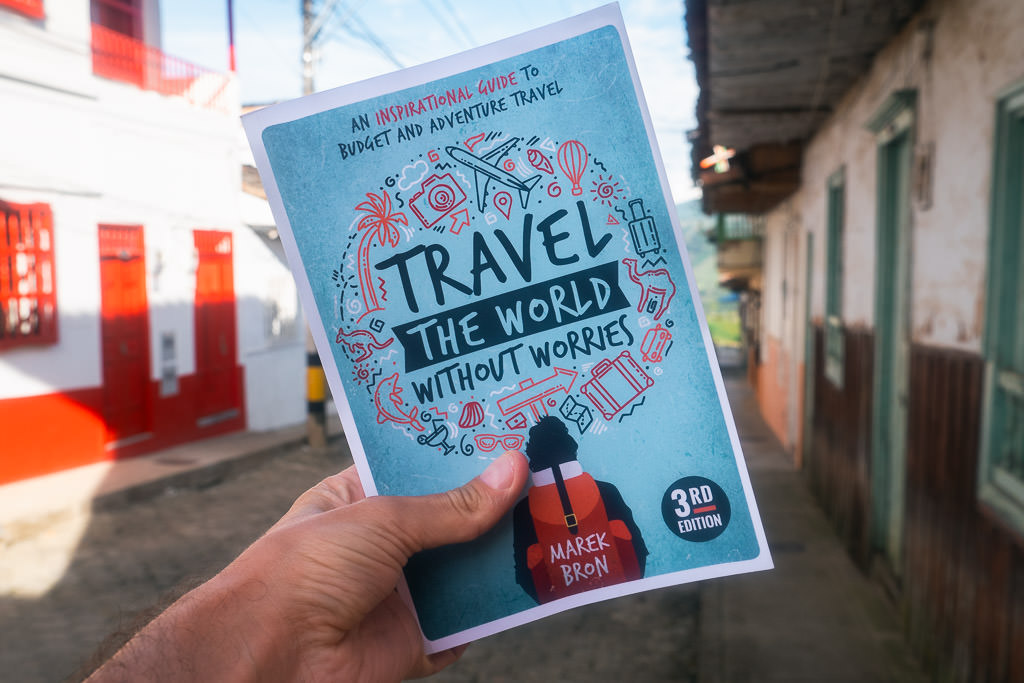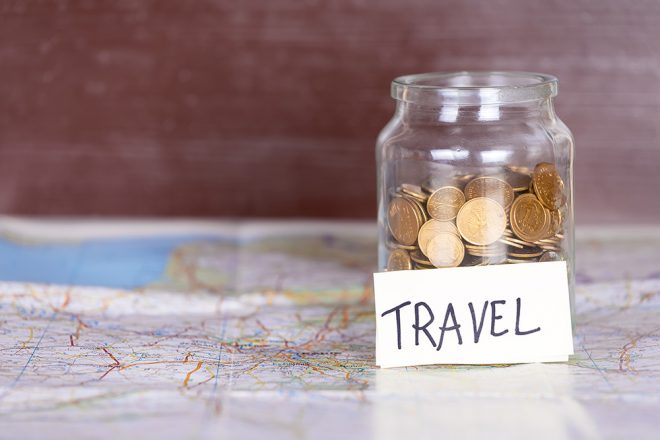Figuring out a budget for a world trip is no easy feat, as there are so many variables to consider. But since I’ve been asked so many times how much you need to save to travel for one year, let me give it my best shot at answering.
If you’re planning a career break, round-the-world trip, gap year, or digital nomad lifestyle, you might be interested in the annual or ongoing monthly costs you can expect. The answers depend hugely on your travel style and the destinations you choose, so let me break it down a bit.
So how much does it cost to travel the world?
Unfortunately, asking “how much is a year of travel?” is kind of akin to asking “how big is a fish?”.
It all depends… are we talking about a dwarf goby, or a whale shark?
Okay, weird metaphor, but the point is that a year-long journey can be as cheap or as expensive as you make it. There are examples of people being extremely frugal and spending barely anything at all and others of travellers spending truly ‘whale shark’ levels of cash on their once-in-a-lifetime dream trip.
It’s difficult, if not impossible, to give a precise cost breakdown for one year of travel, but it is possible to give a rough ballpark idea.
If travelling low-budget-style in the cheapest countries, then consider a minimal budget of around $16,000 for one person. This is if you’re, say, travelling as a backpacker or a budget-conscious independent traveller through inexpensive regions like Southeast Asia. Add more developed high-income countries (such as Western European countries) and a minimum of $33,000 might be more realistic when travelling on a budget.
These figures are based on my own experiences, various travel budgeting tools I’ve used, and estimates from other travelers.
I last updated the prices here for inflation in 2024. Besides general inflation, there have also been increased prices in tourism specifically in the years since the pandemic. In my experience, flights are no longer the biggest budget challenge as there are good deals to be found again if you’re flexible and look around. Prices for accommodation in popular tourist hotspots still seem very elevated though (for instance in Western Europe). Even backpacker hostels can be very expensive now in popular European capitals wherever people also often go on shorter trips.
If you’re trying to stick to a budget, it helps hugely to travel out of high season and to seek out more off-the-beaten-path places, which you have a lot more opportunities to do when you’re travelling long-term!
Things that can LOWER your costs: traveling overland, focusing on a specific region, cooking more of your own meals, relying on local connections or free activities instead of off-the-shelf tours and guided experiences, being strategic with timing your visits to countries when accommodation is cheaper, adding volunteering or local jobs to your trip where you stay in one place for a while
Things that can INCREASE your costs: hopping a lot between countries/continents, flying a lot, always spending like a tourist on a holiday, travelling in places only in high season, and targetting only the most touristy destinations
Since so much depends on where and how you travel, let me break things down into several categories below.
Note: The costs indicated here don’t include pre-travel expenses (insurance, your flight to/from home, etc.) and only the costs incurred once you are actually on the road, such as sightseeing, accommodation, and transportation.
Option 1. Travel minimally in cheap countries
Annual cost: $8000 / €7500 / £6500 at minimum
Monthly cost: $700 / €650 / £550 at minimum
This is the absolute most basic way to travel the world.
It requires focusing exclusively on the cheapest countries in the developing world as well as being super frugal. This is the category of the vagabonds and the drifters with only the smallest of shoestring budgets.
Maybe you could spend time in off-the-beaten-track Central America sleeping only in your own tent or hammock, eating cheap buffet meals (and saving leftovers for later), hitch-hiking, and only going on activities that are free. You could go to India and fully immerse yourself in the local lifestyle, avoiding any of the popular tourist sites, and moving from place to place in crowded 3rd class train carriages only.
This is travel for the ultimate free birds, content to spend much of their days reading books or plucking their guitar instead of doing more expensive sightseeing.
It’s maybe surprising that you could travel a year for around $8000, but I have seen people do it.
I met a guy in Nicaragua traveling on just $15 a day: all he had to pay for was a place to put his tent, and he bought his food straight from local bakeries and fruit farmers. The rest of his budget was for taking buses whenever he couldn’t find a way to hitchhike safety.
You do really have to embrace the hippie lifestyle and reduce everything down to their basics, which is maybe not for everyone.
Option 2. Travel fairly comfortably in cheap countries
Annual cost: $16000+ / €15000+ / £13000+
Monthly cost: $1300+ / €1200+ / £1050+
If you are not too fussy, you can travel very comfortably in many developing countries around the world. If you can make do with basic accommodation and are fine eating mostly the local cuisine, you can travel for less than you may think.
Expect to need about $1100 to $1300 a month for many budget-friendly countries in Latin America, South- and Southeast Asia, the Balkans in other cheap destinations in Europe. You may have to “live like a local” a bit sometimes, but you will generally be able to afford an otherwise comfortable lifestyle with very few real restrictions.
As a rough rule of thumb, it costs about $1200 a month, give or take, to travel in many developing countries.
With such a budget, you can easily afford hostel beds or basic hotel rooms (particularly if shared between 2 people), go sightseeing whenever you’d like, have sit-down restaurant meals multiple times a day, and move about using local transportation, tourist shuttle services, or the occasional short-distance flight.
This style of travel is most commonly associated with backpacking, round-the-world trips, and career break trips. It’s especially attractive if you’re from a high-income country, as your Western currency will take you further elsewhere in the world.
Of course, the standard of living in developing countries may be lower than you are used to at home. Don’t necessarily expect to get a Danish craft beer with your pho noodles in Vietnam or for that ramshackle bus in Ecuador to be exactly on time. But once you adjust to the local pace and lifestyle, you can feel like you truly have everything you need. I’ve traveled a lot in this style, and I can’t get enough of it!
Option 3. Travel frugally in expensive countries
Annual cost: $33000+ / €31000+ / £26000+
Monthly cost: $2700+ / €2500+ / £2100+
Travelling long-term in developed countries can be astronomically costly if you travel the same way you would on a regular holiday. The cost of hotels alone can send your budget spiralling out of control. The alternative is to find creative ways to travel cheaply in expensive countries, such as many of those in Western Europe, Oceania, or North America.
This could mean cooking your own meals in a hostel or in holiday apartment kitchens or eating packed lunches. You will typically avoid the most expensive tours and activities, instead enjoying publicly accessible sights or going on free city walking tours.
However, you may not have to go to quite these extremes if you limit your overall time in expensive countries and budget adequately.
It’s no coincidence that many travellers opt to go to Europe, Australia, or the U.S. for one or two months—and not ordinarily for half a year or a year, as this is much more difficult for many to sustain unless you are a digital nomad with a constant income source.
This is the sort of cost you’ll likely be looking at for a round-the-world or RTW trip, particularly one that has stopovers in many Western countries, mixed with a few cheaper ones. It’s also a good ballpark for digital nomad travellers who will focus on developed or trendy medium-budget places (e.g. Lisbon, Mexico City, etc.).
4. Travel lavishly in expensive countries
Annual cost: $130000+ / €120000+ / £105000+
Monthly cost: $10500+ / €9800+ / £8500+
When money is of virtually no concern, you can truly go everywhere and do anything. I’ve heard of some luxury travel bloggers who spend well over $100,000 a year!
This is a category of travel I honestly know the least about. Even when I can afford high-end accommodation or luxury tours, I still travel budget-style because I prefer staying close to the ground. Authentic experiences and local adventures just seem to come to you more easily when you’re not locked up inside the Grand Hyatt.
I still include this estimate here because I think a lot of people assume this is what you need to travel the world for a year. In fact, the previous three budget categories are far more realistic on an average person’s budget.
How to travel long-term
If you’re planning to hit the road for an extended period, then I can help! As a full-time travel blogger for over 12 years, I’ve done my share of budgeting and planning big trips of many different lengths. My first trip around the world took two years nonstop.
Although it can seem daunting to travel for a whole year or even several months, it can give you the experience of a lifetime. If you want to more easily navigate all the steps—from planning and packing to preparation and the travelling itself—you will benefit hugely from grabbing a copy of my book, Travel the World Without Worries.
It goes into FAR more depth on this topic than anything else I’ve written. You’ll unlock my most hard-won travel advice, my most detailed insights into long-term travel, and my most personal anecdotes that will help you avoid the mistakes that I made!
Just take a look at the reader reviews to see if it might help you out as well.

Buy my book Travel the World Without Worries and you will get:
- Strategies for saving up money for your trip more easily and reducing costs at home while you’re away
- Expert money-saving tips to use when you’re on the road as well as reducing pre-trip costs (such as flights, insurance, etc.)
- Advice for using local travel jobs or digital nomading to extend your travels, or using the ‘backpacker ways’ to travel longer without working
- Practical advice for all other aspects of planning a big trip abroad
More about travel budgeting
I’ve written a lot more about budget travel at Indie Traveller, so for a deeper dive into this topic you may also enjoy these posts:
- My favorite budget-friendly countries
- Southeast Asia cost of travel overview
- South America cost of travel overview
- Central America cost of travel overview
- Cheapest countries in Europe
- How to get free accommodation when travelling
- How to work remotely and travel
Some links may be affiliate links, meaning I may earn commission from products or services I recommend. For more, see site policies.







I know this is an old post but I thought I’d chime in. I traveled solo for 9 months (3.5 months in Central America, 4 months in Western Europe, and 1.5 months in the Balkans) and averaged $4,000 a month. This was staying in mainly boutique hotels and very nice Airbnbs. I also didn’t skimp on any activities, but I am kind of cheap about food. Overall I spent more than I had originally budgeted, but felt it was a good value for the level of luxury and the splurges I kept making.
Appreciate your comment Elle. There are definitely many ways (and budgets) to travel so if you can afford to spend extra, it can definitely be worth the comfort 🙂
Hi Marek,
Do you know of any travel agencies etc. that have tours? I am single 51 and I am considering quoting my job and traveling the world for a year. Being a single female I would feel more comfortable with a group even though I’m not one for organized travel -I like to wing it,I think it’s best I’m this case to be with a group
I don’t have personal experience with them but I hear Intrepid Travel does good small-group tours for all ages.
Maybe it could be nice to mix group tours with some solo exploration in between… then you get the best of both worlds 🙂
After reading your book and a lot of your content on this site, I’ve got a strong sense of what I need to save for my plan to take a year off to travel the globe. You have one of the most useful and interesting blogs that I’ve read, and it’s given me so many ideas. Please keep up your amazing work!
One suggestion: this is a great article that I think needs a refresher for the new travel realities and costs of 2021 and beyond.
Cheers!
Hey Jason, thanks for your kind words! I definitely plan to give this article an update sometime. I’m mostly thinking of adjustments for inflation, but maybe other things will have also changed. The pandemic situation changes so often that I’m waiting a bit before updating general posts such as these, but it’s on the to-do list 🙂
Hopefully that world trip will be possible/easier again in the not too distant future!
I literally want to travel around the world; I’m retired and have a budget of $100,000-and all of the time I need.
Please advise me on what you would do…nothing rugged, but I don’t HAVE to go 1st class.
Hi Marek. I’ve been dreaming of a RTW trip for many years. I’m in a huge tug of war with myself over taking the leap or not. I currently earn $150k a year and am afraid I will never see that kind of cash again. On the other hand, I’m about to turn 30 and don’t want to blink and soon be turning 40. Any words of advice? I really appreciate your blogs and and life experiences 🙂
Hi Cameron. Oof, that’s VERY tough to comment on. Who knows what’s the right move? I can tell you that I had a very well-paid job (though not as well as yours) which I lost, and I used the redundancy money to fund my world trip. I realized I didn’t actually like the job/industry I was in, so I took it as a sign to do something else. I did have a tough 6-12 months after coming back where I was pretty rudderless, though I was not trying to get back to my old career which would have been easier.
I do believe you can pick a career up again so long as you have specific valuable skills, which I assume you must have on that salary. A friend of mine went on an RTW trip, then towards the end got a call from a recruiter while he was on a beach in Thailand. He interviewed on Skype, and two weeks later he was a marketing exec again, exactly where he’d left off, just in a different company.
I can say that I have zero regrets on the choices I made, and feel *very* grateful to have travelled while I could. Travelling has literally been priceless. The fact that you’re seriously considering going on a RTW trip says to me you probably should, but then again I don’t know your particular circumstances or what makes you happy! That said I know of so many people who are grateful they took the leap, and I can’t think of anyone who regretted it… 🙂
Hi Marek, I have found your blogs very helpful, my wife and I are gearing up to travel Asia in October, flights booked already, renting our property out and just going, hopefully Clare will teach and I will do what I can, but we have no plans to come back to the UK in any hurry, I will try to give you an update as we go..many thanks, P.s we rode the entire length on Thailand 16yrs ago by motorbike so now we have more time to explore other countries..woo hoo!!
Very exciting! Have an amazing trip! 🙂
My wife and I sold all of our possessions in Canada that would not fit into two suitcases and two carry on’s and moved to the area around Playa del Carmen, Mexico. We are into our fourth year of renting a beautiful, furnished condo in our beach community and plan on staying another year or so. (waiting for my last pension to kick in) After that we will sell what we have accumulated that won’t fit in a couple of backpacks (a used mini van, a sewing machine and a water cooler) and hit the road. I’m 64 yrs and my wife is 60. We fast walk 8 kms, 5 days a week and have no health problems. We want to travel, everywhere we can, for as long as we can. We are completely inexperienced at this type of adventure but we are reading everything we can on the subject (including your book, as soon as I finish this post) Our after tax income will be in the area of 58,000 annual, which should be sufficient because we won’t have a condo lease or car expenses we have here. Don’t know where we will begin but I assume we will start in Latin America because we are familiar already with the culture. Good way to get our feet wet.
I have really enjoyed the info presented on this site and look forward to reading your book and starting another new chapter in our lives. Gracias Buen dia.
Wonderful story Peter, I love hearing about these life decisions you’ve taken. You two are living the dream! Thanks for your kind words and good luck 🙂
Hi Marek,
I was looking at flights between South American countries but they seem incredibly expensive. For example, a non-stop 2hour flight from Quito to Lima is $600+ one way… I am only looking on Google Flights, so I am not sure if there are cheaper alternatives?
That’s just South America unfortunately. There are very few budget carriers and prices tend to be high (I’ve been told it has to do in part with taxes/regulations). It’s worth having a look on Momondo or Skyscanner (see this post). Otherwise, overnight buses are cheaper but that’s like a 2 day trip.
Does this include air fare?
No, this assumes only the on-the-ground travel costs. Airfare can obviously be variable depending on whether you’d travel overland through different regions (much cheaper) or hop around the globe anywhere (much more expensive).